Latest News
2026.01.19
News | Taiwan Blood Services Foundation ESG
- News
- Latest News
- Fulian Elementary School's "Easy Blood Lessons for Young Adults" — A Visit to the Taipei Blood Center
Back to List
Fulian Elementary School's "Easy Blood Lessons for Young Adults" — A Visit to the Taipei Blood Center
Latest News
2024.10.08
The blood donation movement in Taiwan has been cultivated for 50 years, and last year, the Taiwan Blood Services Foundation published Taiwan’s first illustrated book on blood science designed for teenagers, titled Easy Blood Lessons for Young Adults. The book aims to encourage children to better understand the importance of blood and blood donation through an easy-to-understand, illustrated format. How can these concepts take root among young people? The Taipei Blood Center invited all the students and teachers of Fulian Elementary School in Gongliao District, New Taipei City, to visit and learn about the correct understanding of blood donation in a simple yet clear manner.
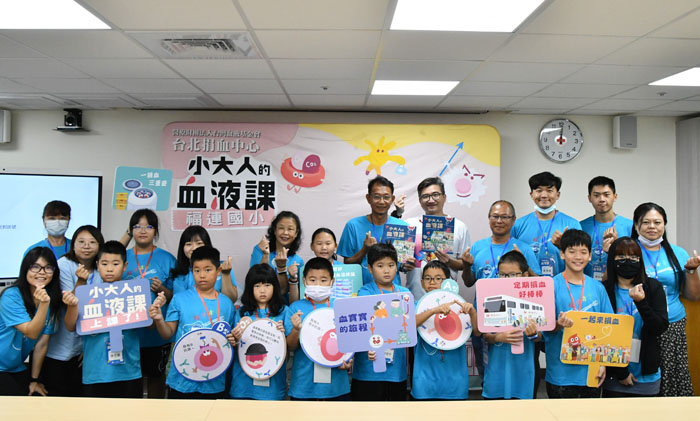
Fulian Elementary School Principal Liang Junhong (center back) led 21 students and teachers to the Taipei Blood Center for *The Little Adult's Blood Lesson* off-campus observation activity.
On the morning of September 11, after the students and teachers of Fulian Elementary School arrived at the Taipei Blood Center, Director Lin Min-chang personally welcomed everyone on behalf of the center. He exchanged souvenirs with Principal Liang Junhong of Fulian Elementary School, and each teacher and student received a copy of Easy Blood Lessons for Young Adults. Director Lin began by emphasizing that blood is very important because it is a key element in sustaining life. When doctors need blood to treat patients, the blood donation center plays a vital role in supplying it. Currently, around 6,000 bags of blood are needed daily throughout Taiwan, with approximately 2,000 bags being required in the areas covered by the Taipei Blood Center, including Taipei, New Taipei, Keelung, Yilan, and Hualien. However, the blood collected from donors cannot be used immediately—it must undergo several stages of testing and preparation before being sent to hospitals to help patients. This event aimed to help teachers and students understand the process of how blood from donors becomes transfusable blood bags.
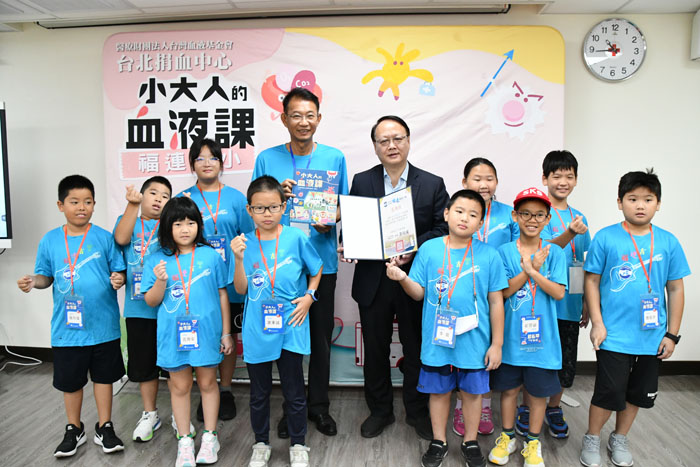
Taipei Blood Center Director Lin Min-chang (third from right, back row) presents *The Little Adult's Blood Lesson*.
Starting with "Helping Others" to Teach Children the Correct Concepts of Blood Donation
The session was led by Planning Department Chief Liu Junhong, who explained the importance of blood in a simple and engaging manner. He asked the students, "If helping others makes you happy, how would you choose to help someone?" With the idea of "finding joy in helping others" as the starting point, he encouraged the students to think about different ways they could help people. Liu also clarified several key concepts, such as: What is blood donation/transfusion? Why should people donate blood? What are the benefits of blood donation? Who needs transfusions? And how does the declining birth rate impact blood donation? These were questions that some students may have thought about but never found answers to, while others had likely never considered them before. The visit provided an opportunity for them to reflect and gain a deeper understanding.
To prepare the students for their tour of the various departments responsible for blood processing and storage, Chief Liu first explained the blood processing workflow in the lobby, then led everyone to the donation room. There, a donor happened to be giving blood, allowing the students and teachers to observe the blood collection process and ask the donor questions.
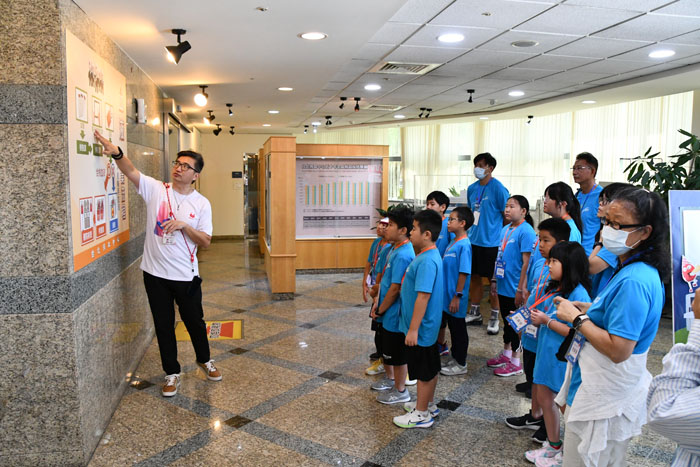
Planning Department Chief Liu Junhong explaining the blood processing workflow.
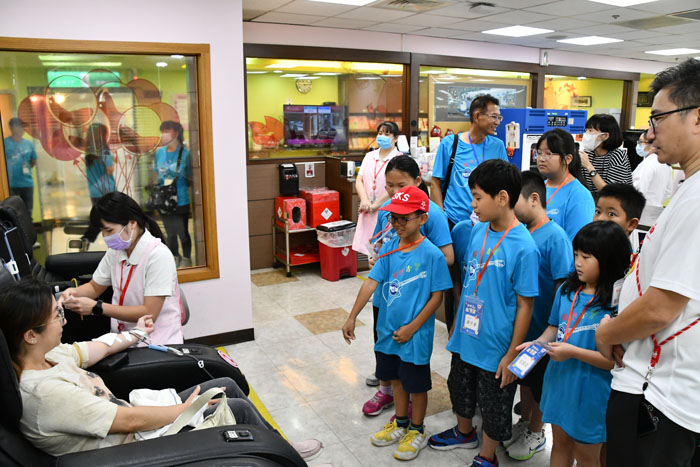
Children observing the blood donation process.
Next, they visited the Component Department, where through glass windows, the students could see machines that resembled washing machines—centrifuges responsible for separating blood components. Liu explained the video displayed on the wall and answered questions from the principal and students about what they didn’t understand. As the students learned, blood is drawn into tubes for testing by the Testing Department to screen for viruses such as HIV, Hepatitis B, Hepatitis C, and syphilis, which are transmitted through blood. "Every bag of blood donated must be tested," said Chief Liu. Beyond learning about antibodies that match various blood types, the most important task of the Testing Department is ensuring that the blood supplied to transfusion patients is safe.
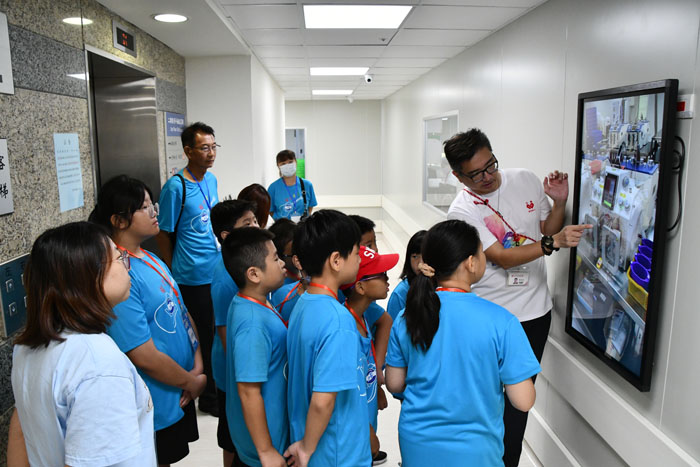
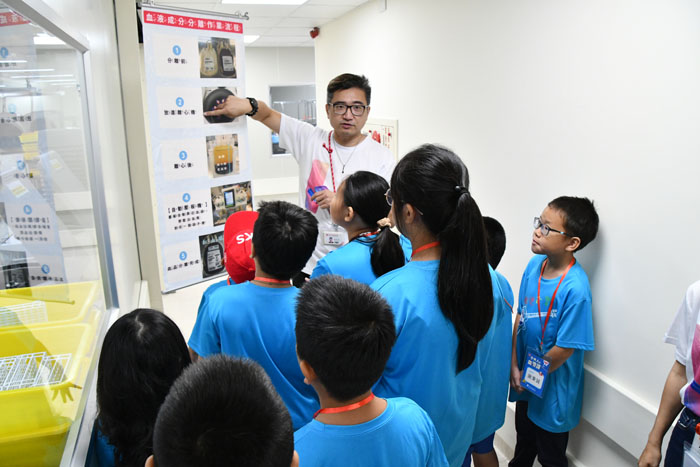
Children listening attentively to the process of preparing blood components.
Finally, Chief Liu led the group to the Supply Department, where they experienced the cold storage environment. Once the Component Department confirms that the blood is safe, the blood bags are sent to the Supply Department for storage. Different components of blood require different storage temperatures: red blood cells are stored at 4°C, while plasma is kept at -20°C. Despite the hot weather, the students watched in amazement as workers in thick down jackets entered and exited the plasma storage freezer. Ensuring the correct temperature for blood storage is just part of the daily routine for the Supply Department staff!
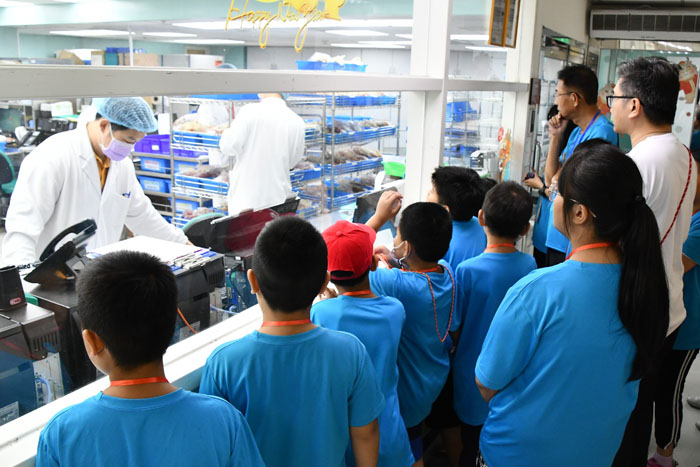
Children observing the preparation process before blood products are supplied to hospitals through a glass window.
Connecting Knowledge with Emotions to Inspire Internal Motivation in Students
Fulian Elementary School, located in Gongliao District, New Taipei City, is a small school with only ten students. Over the years, both the government and private enterprises have provided support and resources for rural education. More and more charitable organizations have invited them to participate in activities that benefit the students' life experiences, and Principal Liang is always happy to allow them to do so. "Blood donation is closely related to everyone. People may not pay much attention to it, but it is closely tied to public health and safety, with a significant impact," said Principal Liang. Though he is also a blood donor, it was through this tour that he learned about the entire process of blood collection and distribution to hospitals. Some of the students' parents are blood donors as well, but the children had limited and sometimes incorrect knowledge. After seeing the entire process, they gained a more complete understanding of this vital medical practice.
Principal Liang believes that blood donation is a positive and necessary action, but he has observed that the proportion of young blood donors remains low. As an educator, he feels that teaching correct knowledge and values from a young age, and helping children realize how meaningful it is to them personally, is crucial. However, "motivation" is also a key factor. Through educational outreach and the reinforcement of these concepts in school curricula, a positive and proactive attitude can gradually be cultivated. Both Principal Liang and the teachers greatly appreciated the tour, noting that experiencing the process of blood collection and transformation into life-saving medical products left a deep and lasting impression on the students. Some teachers even donated blood on the spot, adding even more positive significance to the event.
But does the event end there? According to Principal Liang, definitely not. His habit after such activities is to hold a school assembly to engage in a two-way exchange with the students. "If there’s no follow-up, the impact may fade, or it might not have any effect at all," he explained. "I want to know what the students have learned. I’ll also make some supplementary points and see if they’ve really absorbed the information." While the students have received a lot of new information, it’s even more important to see if they will put what they've learned into action. By guiding and inspiring students through education, Principal Liang hopes to help them grow in both knowledge and attitude.
Visiting Taipower to Learn about Electricity and a Fun Mystery Unveiling
After the visit to the Taipei Blood Center, the Planning Department also arranged for the group to visit the nearby Taipower Taipei North District Office. Upon arriving, the students were warmly welcomed by Taipower staff, and Director Xu Yi-nv interacted with them, giving each student a limited-edition Taipower snack. She also announced an exciting mystery unveiling event that would take place later.
Energy conservation has always been a civic responsibility. Since they were visiting Taipower, the group naturally learned about where electricity comes from, its importance, and how to use it responsibly. After a briefing by Energy Conservation Department Head Guo Puren, a quiz with prizes was held, and the students eagerly participated, vying for adorable gashapon toys as rewards—proof that they had been paying close attention during the lesson.
Finally, the director and department head led the group outdoors for the much-anticipated unveiling ceremony. On the ground were neatly arranged the safety gear used by Taipower workers when working on electrical poles: helmets, shoulder pads, gloves, safety boots, and more. In addition to detailed explanations, the staff invited the students to try on the gear and experience firsthand the challenges faced by Taipower employees. With all the gear weighing over 10 kilograms, workers brave the elements, whether under the scorching sun or in pouring rain, to restore electricity as quickly as possible during power outages. This hands-on experience helped the students better empathize with the hard work of the repair crews and understand the importance of electricity conservation.
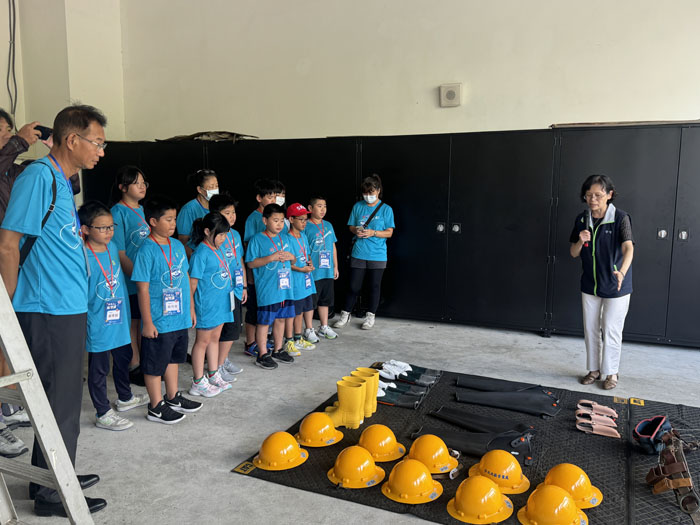 。
。
Director Xu Yi-nv of the Taipei North District Office of Taipower explaining the equipment used by maintenance workers.
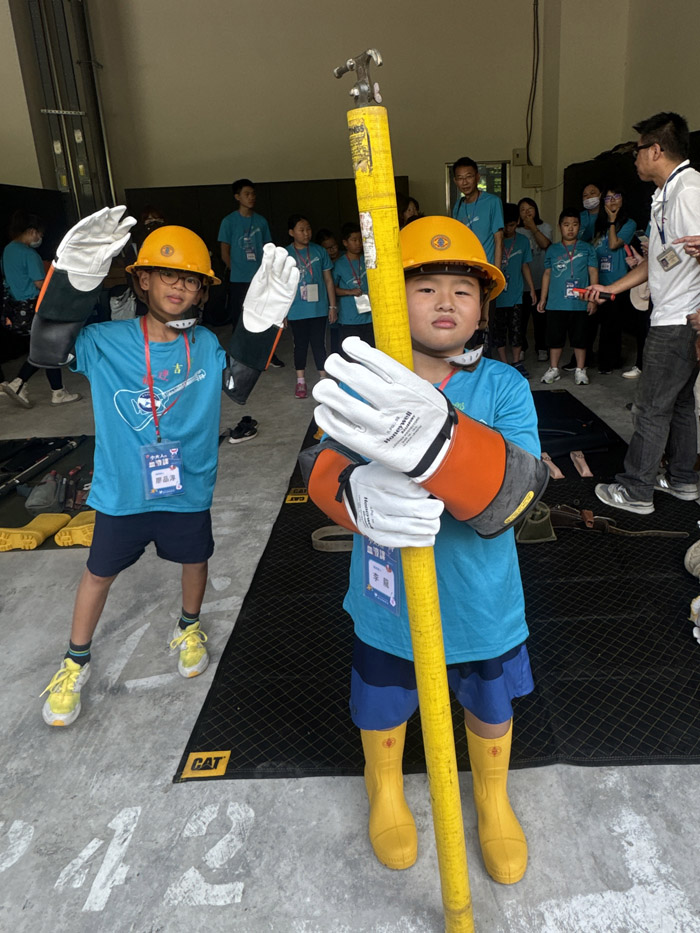
Children try on the gear to experience the hard work of the staff.
This full day of activities was highly meaningful for the students and teachers of Fulian Elementary School. In addition to understanding the significance of blood and electricity in life, they gained a new appreciation for the workers who ensure these resources are available. Such face-to-face interactions will leave a deep and positive memory in the hearts of these children!

Fulian Elementary School Principal Liang Junhong (center back) led 21 students and teachers to the Taipei Blood Center for *The Little Adult's Blood Lesson* off-campus observation activity.
On the morning of September 11, after the students and teachers of Fulian Elementary School arrived at the Taipei Blood Center, Director Lin Min-chang personally welcomed everyone on behalf of the center. He exchanged souvenirs with Principal Liang Junhong of Fulian Elementary School, and each teacher and student received a copy of Easy Blood Lessons for Young Adults. Director Lin began by emphasizing that blood is very important because it is a key element in sustaining life. When doctors need blood to treat patients, the blood donation center plays a vital role in supplying it. Currently, around 6,000 bags of blood are needed daily throughout Taiwan, with approximately 2,000 bags being required in the areas covered by the Taipei Blood Center, including Taipei, New Taipei, Keelung, Yilan, and Hualien. However, the blood collected from donors cannot be used immediately—it must undergo several stages of testing and preparation before being sent to hospitals to help patients. This event aimed to help teachers and students understand the process of how blood from donors becomes transfusable blood bags.

Taipei Blood Center Director Lin Min-chang (third from right, back row) presents *The Little Adult's Blood Lesson*.
Starting with "Helping Others" to Teach Children the Correct Concepts of Blood Donation
The session was led by Planning Department Chief Liu Junhong, who explained the importance of blood in a simple and engaging manner. He asked the students, "If helping others makes you happy, how would you choose to help someone?" With the idea of "finding joy in helping others" as the starting point, he encouraged the students to think about different ways they could help people. Liu also clarified several key concepts, such as: What is blood donation/transfusion? Why should people donate blood? What are the benefits of blood donation? Who needs transfusions? And how does the declining birth rate impact blood donation? These were questions that some students may have thought about but never found answers to, while others had likely never considered them before. The visit provided an opportunity for them to reflect and gain a deeper understanding.
To prepare the students for their tour of the various departments responsible for blood processing and storage, Chief Liu first explained the blood processing workflow in the lobby, then led everyone to the donation room. There, a donor happened to be giving blood, allowing the students and teachers to observe the blood collection process and ask the donor questions.

Planning Department Chief Liu Junhong explaining the blood processing workflow.

Children observing the blood donation process.
Next, they visited the Component Department, where through glass windows, the students could see machines that resembled washing machines—centrifuges responsible for separating blood components. Liu explained the video displayed on the wall and answered questions from the principal and students about what they didn’t understand. As the students learned, blood is drawn into tubes for testing by the Testing Department to screen for viruses such as HIV, Hepatitis B, Hepatitis C, and syphilis, which are transmitted through blood. "Every bag of blood donated must be tested," said Chief Liu. Beyond learning about antibodies that match various blood types, the most important task of the Testing Department is ensuring that the blood supplied to transfusion patients is safe.


Children listening attentively to the process of preparing blood components.
Finally, Chief Liu led the group to the Supply Department, where they experienced the cold storage environment. Once the Component Department confirms that the blood is safe, the blood bags are sent to the Supply Department for storage. Different components of blood require different storage temperatures: red blood cells are stored at 4°C, while plasma is kept at -20°C. Despite the hot weather, the students watched in amazement as workers in thick down jackets entered and exited the plasma storage freezer. Ensuring the correct temperature for blood storage is just part of the daily routine for the Supply Department staff!

Children observing the preparation process before blood products are supplied to hospitals through a glass window.
Connecting Knowledge with Emotions to Inspire Internal Motivation in Students
Fulian Elementary School, located in Gongliao District, New Taipei City, is a small school with only ten students. Over the years, both the government and private enterprises have provided support and resources for rural education. More and more charitable organizations have invited them to participate in activities that benefit the students' life experiences, and Principal Liang is always happy to allow them to do so. "Blood donation is closely related to everyone. People may not pay much attention to it, but it is closely tied to public health and safety, with a significant impact," said Principal Liang. Though he is also a blood donor, it was through this tour that he learned about the entire process of blood collection and distribution to hospitals. Some of the students' parents are blood donors as well, but the children had limited and sometimes incorrect knowledge. After seeing the entire process, they gained a more complete understanding of this vital medical practice.
Principal Liang believes that blood donation is a positive and necessary action, but he has observed that the proportion of young blood donors remains low. As an educator, he feels that teaching correct knowledge and values from a young age, and helping children realize how meaningful it is to them personally, is crucial. However, "motivation" is also a key factor. Through educational outreach and the reinforcement of these concepts in school curricula, a positive and proactive attitude can gradually be cultivated. Both Principal Liang and the teachers greatly appreciated the tour, noting that experiencing the process of blood collection and transformation into life-saving medical products left a deep and lasting impression on the students. Some teachers even donated blood on the spot, adding even more positive significance to the event.
But does the event end there? According to Principal Liang, definitely not. His habit after such activities is to hold a school assembly to engage in a two-way exchange with the students. "If there’s no follow-up, the impact may fade, or it might not have any effect at all," he explained. "I want to know what the students have learned. I’ll also make some supplementary points and see if they’ve really absorbed the information." While the students have received a lot of new information, it’s even more important to see if they will put what they've learned into action. By guiding and inspiring students through education, Principal Liang hopes to help them grow in both knowledge and attitude.
Visiting Taipower to Learn about Electricity and a Fun Mystery Unveiling
After the visit to the Taipei Blood Center, the Planning Department also arranged for the group to visit the nearby Taipower Taipei North District Office. Upon arriving, the students were warmly welcomed by Taipower staff, and Director Xu Yi-nv interacted with them, giving each student a limited-edition Taipower snack. She also announced an exciting mystery unveiling event that would take place later.
Energy conservation has always been a civic responsibility. Since they were visiting Taipower, the group naturally learned about where electricity comes from, its importance, and how to use it responsibly. After a briefing by Energy Conservation Department Head Guo Puren, a quiz with prizes was held, and the students eagerly participated, vying for adorable gashapon toys as rewards—proof that they had been paying close attention during the lesson.
Finally, the director and department head led the group outdoors for the much-anticipated unveiling ceremony. On the ground were neatly arranged the safety gear used by Taipower workers when working on electrical poles: helmets, shoulder pads, gloves, safety boots, and more. In addition to detailed explanations, the staff invited the students to try on the gear and experience firsthand the challenges faced by Taipower employees. With all the gear weighing over 10 kilograms, workers brave the elements, whether under the scorching sun or in pouring rain, to restore electricity as quickly as possible during power outages. This hands-on experience helped the students better empathize with the hard work of the repair crews and understand the importance of electricity conservation.
 。
。Director Xu Yi-nv of the Taipei North District Office of Taipower explaining the equipment used by maintenance workers.

Children try on the gear to experience the hard work of the staff.
This full day of activities was highly meaningful for the students and teachers of Fulian Elementary School. In addition to understanding the significance of blood and electricity in life, they gained a new appreciation for the workers who ensure these resources are available. Such face-to-face interactions will leave a deep and positive memory in the hearts of these children!
Share on
-
Copied to clipboard
Latest News
2025.09.25
